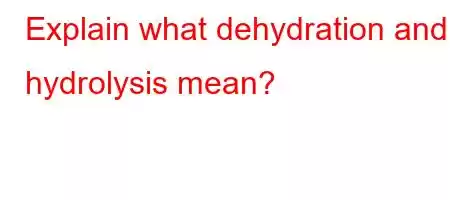Object What is dehydration and hydrolysis?
Contents
Explain what dehydration and hydrolysis mean?
Dehydration: The formation of large molecules by the combination of small molecules is called. Water is released and ATP is consumed. Hydrolysis: The release of small molecules in the structure of large molecules is called. Water is used and ATP is not consumed.
How does hydrolysis happen?
Hydrolysis is catabolic, that is, destruction reactions. They are chemical reactions in which large molecular compounds (such as proteins, lipids) are broken down into smaller molecules using water. They usually occur as the decomposition of water, and this decomposition takes place by distillation.
How do hydrolysis reactions occur?
Hydrolysis usually occurs as a result of the separation of oxygen and hydrogen elements from each other. Hydrolysis occurs as a result of the breakdown of water and chemical bonds. Hence, hydrolysis is a chemical reaction. Hydrolysis occurs when molecules form excess particles with the addition of water.
What is the difference between dehydration synthesis and hydrolysis?
The key difference between dehydration synthesis and hydrolysis is dehydration Its synthesis results in the formation of a large molecule from small molecules while hydrolysis results in the formation of smaller molecules from a large molecule. 1. What is Dehydration Synthesis? 2. What is Hydrolysis 3. What is the Difference Between Dewatering Synthesis and Hydrolysis
What is dehydration synthesis?
What is dehydration synthesis? Dehydration synthesis is the formation of a larger molecule by the release of water molecules. Here, two or more small molecules form covalent bonds with each other, leaving one water molecule for each bond.
Both dehydration synthesis and hydrolysis?
Both dehydration synthesis and hydrolysis are chemical reactions that occur in the presence of water. This is because dehydration synthesis reactions provide water molecules to the environment, while hydrolysis reactions consume water molecules from the reaction mixture.
Well, how is dehydration synthesis done?
Dehydration synthesis is the formation of a larger molecule with the release of water molecules. Here, two or more small molecules form covalent bonds with each other, leaving one water molecule for each bond. Therefore, the end products of dehydration synthesis reactions are always more complex compounds than those of the reagents.
Read: 197


